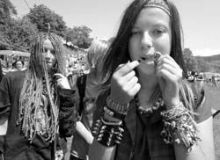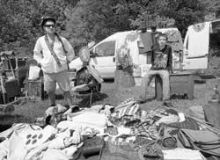For the fourth year in a row the picturesque Hutsul village of Sheshory (local residents stress the first syllable) hosted the International Festival of Ethnic Music and Land Art. Next to the village, which spreads for several kilometers along the Pistynka River, are glades filled with all kinds of grasses and pine forests. Sheshory is about 12 km from Kosiv, the unofficial Hutsul capital.
This year representatives of eight countries took part in the festival. Sheshory, like no place else, has preserved Hutsul melodies, traditions, and crafts, such as woodcarving, weaving, and making woolen homespun bedcovers. The hospitable local residents take great pleasure in showing their wares to visitors. As the Hutsuls say, the mountains flow with milk and honey — the Carpathian version of the Biblical description of heaven. Those who have been here claim that “Sheshory is paradise.”
On the morning of July 12 the streets of this small village turned into veritable hives of activity: people headed for the community center, the place of accreditation, arriving on every kind of vehicle and on foot. Organizers cautioned the guests (about 10,000, almost twice as many as expected) against cutting trees and shrubs or stealing wood from villagers, and advised them, if necessary, to gather firewood in the forest. Guests were also requested not to pitch tents wherever they wanted because any nice-looking glade might well be somebody’s hay-making place. Hay is held in very high esteem because it is practically the only farming crop in this area.
Tents were pitched in clearly designated areas. There were so many tourists that some of them had to seek accommodation in village houses at 20-30 hryvnias a bed. Another source of “hotel business” for the local residents is to rent a yard: visitors paid between 1 and 10 hryvnias to put up a tent and 10-15 to park a car. Even though a torrential downpour and hail came down for several hours, a lot of people wanted to pitch tents in the upper yards.
The festival’s diverse cultural program featured concerts by folk groups from Germany, Poland, Belarus, Moldova, the UK, Romania, Estonia, and Ukraine, preceded by master classes of traditional craftsmen and musicians. Visitors had an opportunity to try their luck at weaving, making straw-dolls, and traditional glass painting. Dance instructors offered to teach anybody Ukrainian, Estonian, Irish, and Oriental dances.
In the glades, right next to the central stage, there were stalls selling traditional Carpathian foods. Most popular were dairy dishes, such as banush, brynza, and kulesha. Folk craftsmen set up a makeshift market to sell old-fashioned and modern embroidered shirts and crafts made of wood and coral. Even the largest department stores could envy the range of goods for sale here. Since supply clearly outstripped demand, prices were reasonable.








